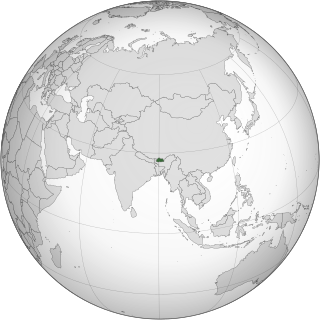 Location of Azerbaijan (dark green) | |
| Medicinal | Illegal |
|---|---|
| Recreational | Illegal |
Cannabis in Azerbaijan is illegal but is cultivated illicitly, and has a long history as a medical remedy in the nation.
 Location of Azerbaijan (dark green) | |
| Medicinal | Illegal |
|---|---|
| Recreational | Illegal |
Cannabis in Azerbaijan is illegal but is cultivated illicitly, and has a long history as a medical remedy in the nation.
Academic Farid Alakbarov has written on cannabis medicines found in medieval Azerbaijani texts, including treatments for uterine tumors, hemorrhoids, and hysteria. [1]
Per a 2011 report, cannabis is cultivated, mostly in southern Azerbaijan, "to a modest extent". [2]

Cannabis is a genus of flowering plants in the family Cannabaceae. The number of species within the genus is disputed. Three species may be recognized: Cannabis sativa, C. indica, and C. ruderalis. Alternatively, C. ruderalis may be included within C. sativa, all three may be treated as subspecies of C. sativa, or C. sativa may be accepted as a single undivided species. The genus is widely accepted as being indigenous to and originating from Asia.

Although Cannabis use is illegal in Egypt, it is often used privately by many. Law enforcements are often particularly lax when it comes to cannabis smokers, and its use is a part of the common culture for many people in Egypt. However, Large-scale smuggling of cannabis is punishable by death, while penalties for possessing even small amounts can also be severe. Despite this, these laws are not enforced in many parts of Egypt, where cannabis is often consumed openly in local cafes.

Cannabis has been illegal in Nepal since 1976, but the country has a long history of use of cannabis for Ayurvedic medicine, intoxicant and misconception as a holy offering for Lord Shiva and continues to produce cannabis illicitly.
Cannabis in Dominica is a Class B drug to cultivate, sell or possess. This means that possession is punishable by 12 months and EC$12,000 (summary) or 2 years and EC$20,000. Supplying, production, or importation are punishable by 3 years and EC$100,000 (summary) or 14 years and EC$200,000.

Cannabis in Bhutan is illegal, but grows prolifically in the country and has multiple traditional uses, such as feeding pigs and producing textiles.
Cannabis in Sierra Leone is illegal, but is widely cultivated and consumed in the country, and exported to neighboring countries and to Europe. Cannabis is known locally as diamba.
Cannabis in Suriname is illegal. Cannabis is the most popular illegal drug in Suriname.
Cannabis in Lesotho is illegal for any use, but largely tolerated. Cannabis is widely produced in the country, being the nation's most significant cash-crop. In the 2000s it was estimated that 70% of the cannabis in South Africa originated in Lesotho. In 2017 Lesotho became the first African nation to grant a license for the cultivation of medical cannabis.
Cannabis in New Caledonia is illegal, but is cultivated illicitly. Sources note that "hard drugs" are rare in New Caledonia, and their drug issues are primarily confined to cannabis, with local Kanak chiefs being anti-drug and working to eradicate cannabis plantations.
Cannabis in French Guiana is illegal, but is illicitly cultivated and transported.
Cannabis in Guadeloupe is illegal, but is cultivated and transported illicitly. A 2007 report noted the prevalence of cannabis among youth in Guadeloupe at 7%.

Cannabis in Tonga is illegal, but cultivated illicitly. A 1990s report attributed increased cannabis usage in Tonga to foreign travelers and returned Tongan emigres.
Cannabis in Bolivia is illegal, but cultivated illicitly, mostly for domestic consumption. Bolivian law treats cannabis equally to cocaine, with possession of one gram punishable by 10–25 years in prison.

Cannabis is illegal in Vietnam, but is cultivated within the country and is known as cần sa.

Both the possession and consumption of cannabis, also known as saba in Fijian, are currently illegal in Fiji, if charged, the minimum prison sentencing is three months.

The history of cannabis and its usage by humans dates back to at least the third millennium BC in written history, and possibly as far back as the Pre-Pottery Neolithic B based on archaeological evidence. For millennia, the plant has been valued for its use for fiber and rope, as food and medicine, and for its psychoactive properties for religious and recreational use.
Cannabis in Cameroon is illegal; the drug is locally referred to as banga.
Cannabis in Senegal is illegal; the drug is locally referred to as yamba.
Cannabis in Mali is illegal.

Cannabis in Burkina Faso is illegal. Burkina Faso's tropical environment makes it perfect for cannabis growth. However, cannabis rates among adolescents are low, as most cannabis grown in Burkina Faso is exported to countries where cannibis cultivation is hindered by climate or legality.